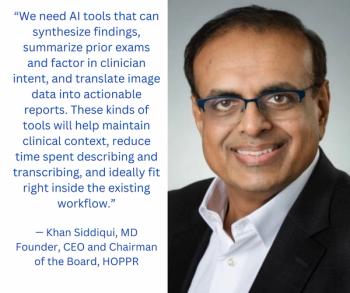
Multicenter Breast Ultrasound Study: AI Bolsters Accuracy and Specificity of BI-RADS Classifications
Emerging breast ultrasound research showed the use of computer-aided diagnosis (CAD), powered by deep learning, led to 24 percent and 36.9 percent improvements in accuracy and specificity, respectively, in the use of BI-RADS classifications by radiologists without breast ultrasound expertise.
For radiologists at non-tertiary or rural hospitals who lacked breast ultrasound expertise, the use of adjunctive deep learning software with breast ultrasound led to a downgrade of nearly 80 percent of initial BI-RADS category 4A assessments to BI-RADS category 3 with only 4.6 percent of those breast lesions being malignant, according to newly published research.
For the multicenter prospective study, recently published in the
The researchers found that adjunctive use of the deep learning software improved the accuracy rate from 62.6 percent to 86.6 percent, the specificity rate from 46 percent to 82.9 percent and the positive predictive value (PPV) from 46.5 percent to 72.7 percent.
The study authors also found significant percentages of downgrading of benign breast lesions and upgrading of malignant lesions initially identified as BI-RADS category 3 lesions.
“CAD resulted in upgrade of 33.3% of malignant lesions classified by readers as (BI-RADS) category 3 to category 4A, and in downgrade of 88.3% of benign lesions classified by readers as category 4A to category 3,” pointed out study co-author Li-Gang Cui, M.D., who is affiliated with the Department of Ultrasound at Peking University Third Hospital in Beijing, China, and colleagues.
(Editor’s note: For related content, see “
The study authors also noted that use of the adjunctive deep learning software had similar sensitivity (94.1 vs. 97.1 percent) and negative predictive value (NPV) (96.7 vs. 97.0 percent) to radiologist assessment.
“The findings indicate the utility of CAD to reduce the frequency of benign breast biopsies without an associated significant impact on breast cancer detection,” emphasized Cui and colleagues. “The CAD system may be particularly useful at centers or geographic regions lacking access to radiologists with expertise in breast ultrasound, to assist in the identification of those lesions that may warrant referral to a center with additional resources related to breast cancer diagnosis.”
In regard to study limitations, the researchers noted they did not assess inter-reader agreement nor compare inexperienced radiologist users of breast ultrasound versus those with expertise in breast ultrasound. They also conceded the possibility of bias as the radiologists were aware that all of the patients were slated to have a biopsy or excision for breast lesions. Pointing out that the cohort was drawn from hospitals in China, Cui and colleagues conceded the possibility of different study findings with more diverse patient populations.
Newsletter
Stay at the forefront of radiology with the Diagnostic Imaging newsletter, delivering the latest news, clinical insights, and imaging advancements for today’s radiologists.














